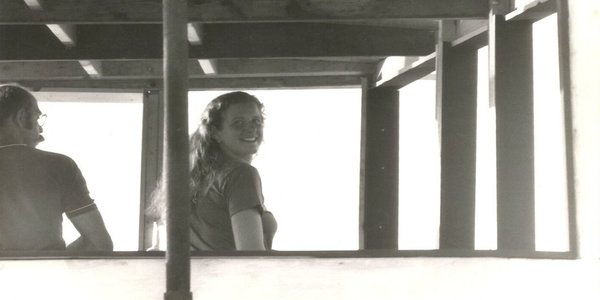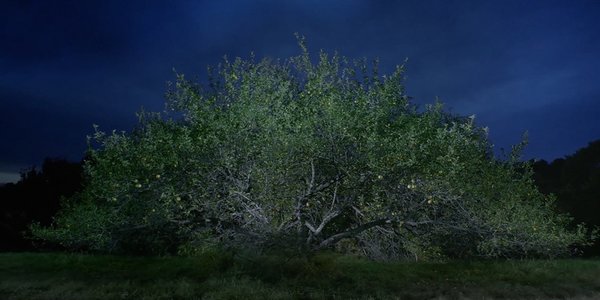GOD KNOWS WHERE I AM: A Sad Tale, Told With Sensitivity

It took me a while to discover the wonderful world…
A woman starves to death, alone in a farmhouse. There are people living in the house across the way, and the farmhouse is right by a busy road. God Knows Where I Am asks two questions, the first simply practical, the second altogether more complicated; How did this happen? And how was this allowed to happen?
A Tragic Story, Told By The Victim
The first of these questions can be answered, at least in part, by Linda Bishop, the dead woman. When her body was found months after her death, alongside it were two notebooks which contained the diary she had been keeping during the last months of her life. Her last days were monotonous, but peaceful; spent reading and collecting apples, which would be the only food she would eat up until her death.
Linda Bishop’s diaries only tell part of the story; the film tells the rest in interviews with her sister, daughter, friends and other people who crossed her path. We learn that as a young woman, she was an outgoing, outdoorsy, happy-go-lucky type. A friend from college says that when Linda showed up: “You knew it was going to be a good day.” Linda was very close with her daughter, Caitlin, whose dad left when she was just 3 years old.

It wasn’t until Caitlin was 14 that Linda‘s mental problems started to become apparent. Working at a Chinese restaurant, Linda became certain that the ‘Chinese Mafia’ were after her, taking her daughter to the other end of the country to escape. She was so paranoid that whenever friends or family contacted them to find out how they were doing, she would give them the wrong location, convinced that they were enemy spies.
After many years of going on medication, feeling fine and so going off medication, only to become ill again, Linda ended up, committed in a New Hampshire Hospital. She was treated for an unspecified mental illness which was effectively a mixture of schizophrenia, paranoia and bipolar disorder.
Within a frighteningly short period of time, Linda went from being looked after by a team of medical professionals to starving to death, alone, in an abandoned farmhouse. And it’s here where God Knows Where I Am answers the second question, which is really the meat of the film; how was this allowed to happen?
Successes and Failures
Linda’s day-to-day existence in her final months was, as I’ve previously mentioned, monotonous. And as such, the filmmakers don’t have a lot to work with when they were illustrating her diary entries (which are read with tremendous empathy by Lori Singer). They make the most of what they have; the film starts with a startlingly beautiful image of a glowing apple tree, and the way the camera glides through Linda’s final home does add an interesting, dreamlike atmosphere to the proceedings. But there are only so many times you can see different arrangements of decaying apples in empty rooms before boredom sets in.

The biggest problem I had with the film was its tone. Essentially, this is a film about systemic failure, causing the premature death of a vulnerable person. It’s the sort of theme that should strike rage into the heart of its viewer; think of I, Daniel Blake, or Dear Zachary: A Letter To A Son About His Father. Both films are about a flawed and inhuman system that results in death. Though one of those films is a documentary, and one fiction, they both palpitate with fury, and as such feel vital, energetic, and important.
God Knows Where I Am doesn’t do that. The prevailing emotion here is sadness, and of course that makes sense. It’s a tragic situation. But sadness and anger shouldn’t be mutually exclusive, and here they are; the former dampens the latter, and takes off a lot of the emotional edge.
What the film does best is raise an issue I haven’t seen dealt with before in either narrative or non-fiction film, and that’s the meaning of freedom for people who don’t have the capacity of making their own decisions. Linda’s death seems ultimately to be the fault of America’s obsession with freedom over everything else, even when that freedom comes at tremendous cost to the person it’s granted to. The film does a good job of acknowledging the complexities of these issues, whilst still making it clear that her death was unnecessary.

In Conclusion
God Knows Where I Am tells an important story with sympathy and sincerity. There’s no doubting the care and the delicacy with which directors Jedd and Todd Wider treat the difficult subject matter, and that’s commendable.
The quiet, thoughtful nature of the documentary is not in itself a bad thing. What this film is missing is the engine of anger that has powered so many other films dealing with similar issues. Without that anger, the film doesn’t linger in the memory very long after the credits have rolled. So, although God Knows Where I Am deserves praise for bringing little-publicized issues to public attention, there doesn’t seem to be enough fire or energy here to change the things that so badly need changing.
What’s the best film you’ve seen about a similar systemic failure? Tell us what your thought in the comments below!
God Knows Where I Am will be released in the US on the March 31, 2017, and in the UK on the April 7, 2017. For all international release date, see here.
Does content like this matter to you?
Become a Member and support film journalism. Unlock access to all of Film Inquiry`s great articles. Join a community of like-minded readers who are passionate about cinema - get access to our private members Network, give back to independent filmmakers, and more.
It took me a while to discover the wonderful world of cinema, but once I did, everything just fell into place.













